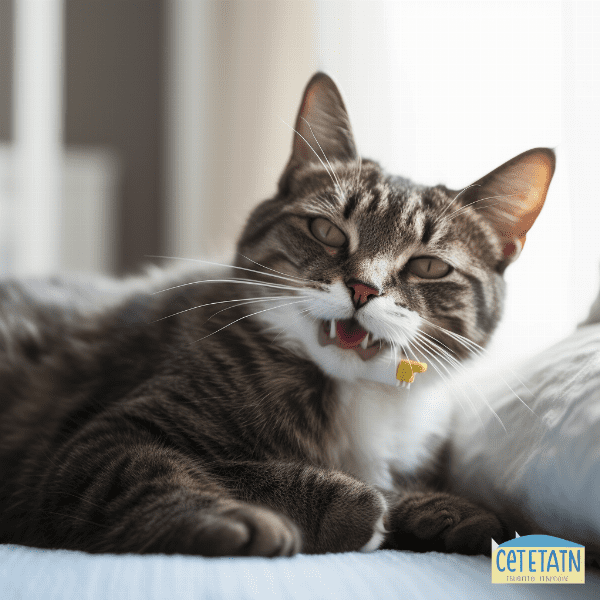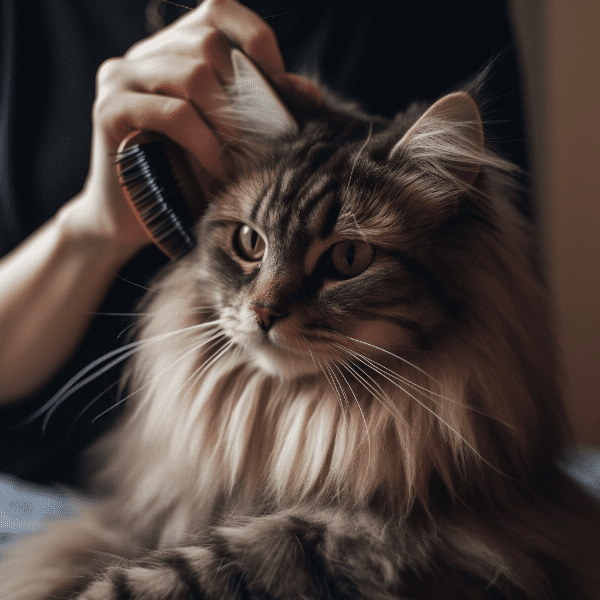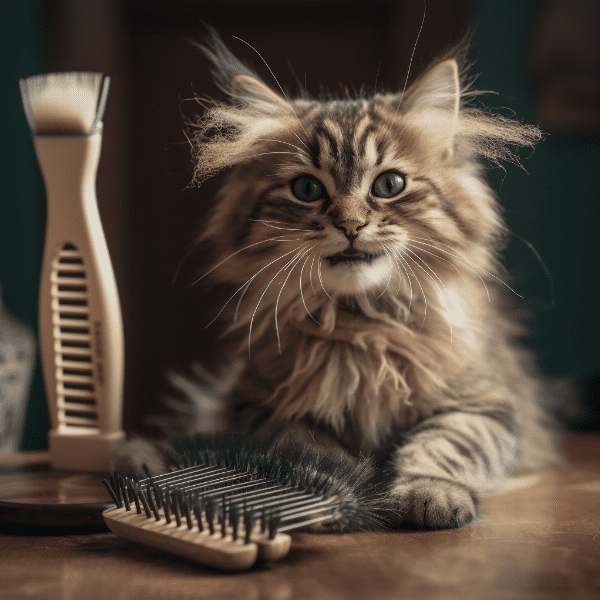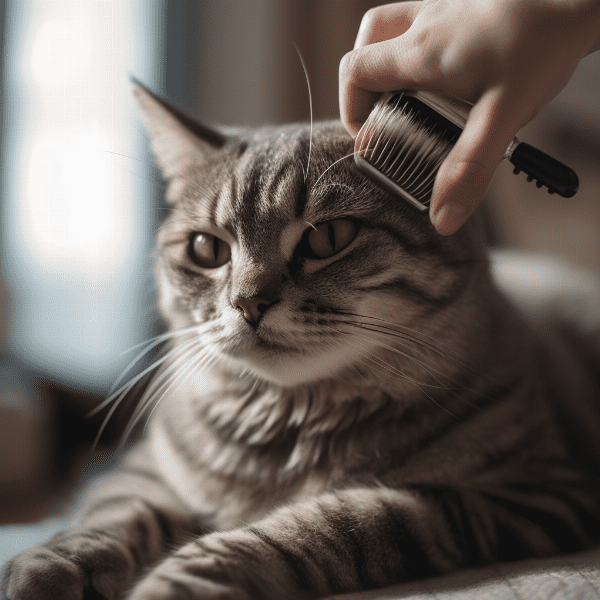Table of Contents
Why it’s important to clean your cat’s teeth
As cat owners, we often focus on providing our pets with proper nutrition, exercise, and grooming. However, oral hygiene is just as important, and neglecting your cat’s teeth can lead to serious health problems.
Prevent dental disease
Dental disease is one of the most common health issues in cats. It can cause tooth loss, gum infections, and even spread bacteria to other parts of the body. Regularly cleaning your cat’s teeth can prevent the buildup of plaque and tartar, which are major contributors to dental disease.
Improve overall health
Good oral hygiene doesn’t just benefit your cat’s teeth and gums, it can also improve their overall health. Poor dental health can lead to painful infections that can affect a cat’s appetite, mood, and energy levels. By keeping your cat’s teeth clean, you can prevent these issues and help them feel their best.
Save money on vet bills
Preventing dental disease through regular cleaning can save you money in the long run. Dental procedures can be expensive and require anesthesia, so investing in preventative care can help you avoid these costs.
Increase bonding time
Cleaning your cat’s teeth can also be a bonding experience. By taking the time to care for your cat’s oral hygiene, you’re showing them that you care about their health and wellbeing. Plus, regular handling of your cat’s mouth can help them get more comfortable with being touched and examined, which can make vet visits less stressful.
In conclusion, cleaning your cat’s teeth is an important part of their overall health and wellbeing. By preventing dental disease, improving their overall health, saving money on vet bills, and increasing bonding time, you’re helping your cat live their best life.
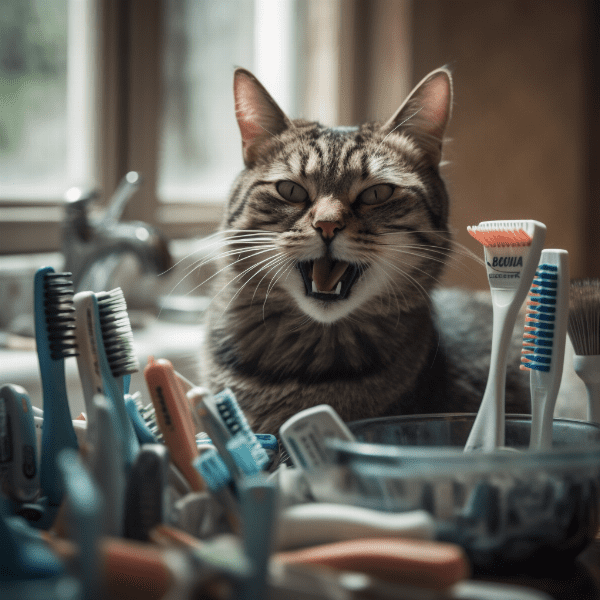
Homemade dental sprays for cats
If you’re looking for a natural and cost-effective way to clean your cat’s teeth, homemade dental sprays may be a good option. Here are some tips and recipes to get you started.
Benefits of homemade dental sprays
Homemade dental sprays are a great alternative to commercial dental products, which can be expensive and contain artificial ingredients. Plus, by making your own spray, you can customize the ingredients to your cat’s specific needs and preferences.
Tips for using dental sprays
To get the most out of your homemade dental spray, it’s important to use it correctly. Start by spraying a small amount onto your cat’s teeth and gums, being careful to avoid their eyes and nose. You can use a soft-bristled toothbrush or a finger brush to gently massage the spray into their teeth and gums. It’s important to not use too much pressure or force, as this can cause your cat discomfort.
Recipes for homemade dental sprays
Here are two simple recipes for homemade dental sprays that you can make with ingredients you may already have at home:
Recipe 1: Baking soda and water spray
Mix 1 tablespoon of baking soda with 1 cup of water in a spray bottle. Shake well and spray directly onto your cat’s teeth and gums.
Recipe 2: Parsley and mint spray
Steep 1 tablespoon of chopped parsley and 1 tablespoon of fresh mint leaves in 1 cup of hot water for 10 minutes. Strain the mixture and pour it into a spray bottle. Shake well and spray onto your cat’s teeth and gums.
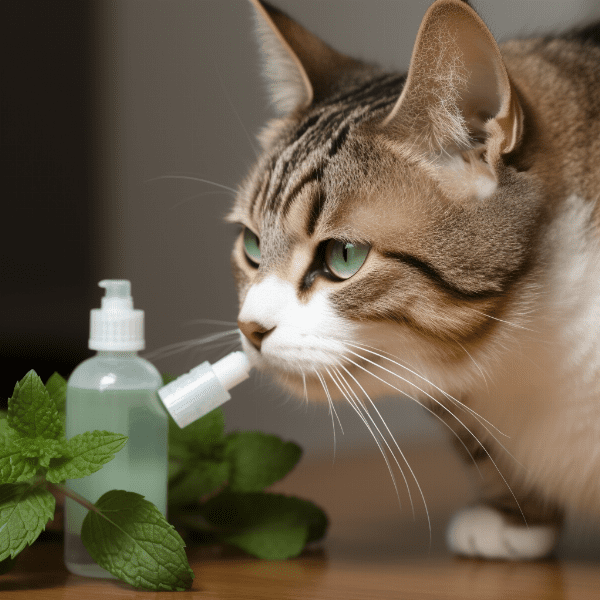
Dental chews and treats for cats
Benefits of dental chews and treats
Dental chews and treats can help scrape away plaque and tartar, freshen breath, and stimulate saliva production, all of which contribute to good dental health. They can also provide your cat with a tasty and enjoyable snack.
What to look for in dental chews and treats
When choosing dental chews and treats for your cat, look for products that have earned the Veterinary Oral Health Council (VOHC) seal of approval. This indicates that the product has been rigorously tested and meets standards for effectiveness in reducing plaque and tartar buildup.
You should also consider the size and texture of the product. Chews and treats that are too small or too hard can pose a choking hazard or cause tooth fractures. Look for products that are specifically designed for cats and that have a texture that is appropriate for your cat’s chewing style.
- Greenies Dental Treats for Cats
- Purina Dentalife Dental Treats for Cats
- Feline Greenies Dental Treats
- Hill’s Prescription Diet Dental Care Chews for Cats
- OraVet Dental Hygiene Chews for Cats
In conclusion, dental chews and treats can be a great addition to your cat’s dental hygiene routine. By choosing products that meet the VOHC standards and are appropriate for your cat’s size and chewing style, you can help keep your cat’s teeth clean and healthy.
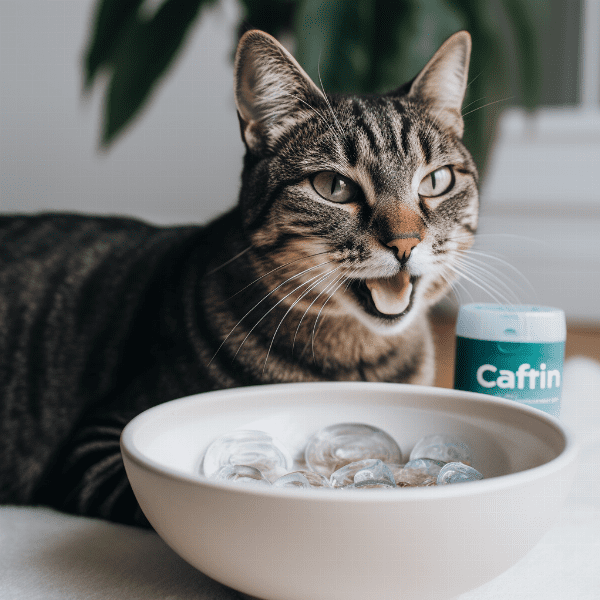
Water additives for fresh breath and clean teeth
Water additives can be an easy and convenient way to help keep your cat’s teeth clean and freshen their breath. Here’s what you need to know about using water additives for your cat.
How water additives work
Water additives are added to your cat’s drinking water and work by promoting saliva production and changing the pH balance in your cat’s mouth. This can help reduce bacteria that cause bad breath and prevent the buildup of plaque and tartar.
Choosing the right water additive
When choosing a water additive for your cat, look for products that are specifically designed for cats and have been approved by the Veterinary Oral Health Council (VOHC). You should also consider your cat’s preferences, as some additives may have a flavor or scent that they don’t like.
It’s important to follow the manufacturer’s instructions for adding the water additive to your cat’s drinking water, as adding too much can cause your cat to refuse to drink.
Examples of water additives
Here are some examples of water additives that are designed for cats and have earned the VOHC seal of approval:
- Healthy Mouth Water Additive for Cats
- Tropiclean Fresh Breath Water Additive for Cats
- Petkin Fresh Breath Water Additive for Cats
- Oxyfresh Pet Oral Hygiene Solution
Additional tips for using water additives
It’s important to note that water additives are not a replacement for regular dental care, such as brushing or professional cleanings. They can be used as a supplement to these routines to help promote good dental health.
In conclusion, water additives can be an easy and convenient way to help keep your cat’s teeth clean and freshen their breath. By choosing the right product and following the manufacturer’s instructions, you can help promote good dental health for your feline friend.
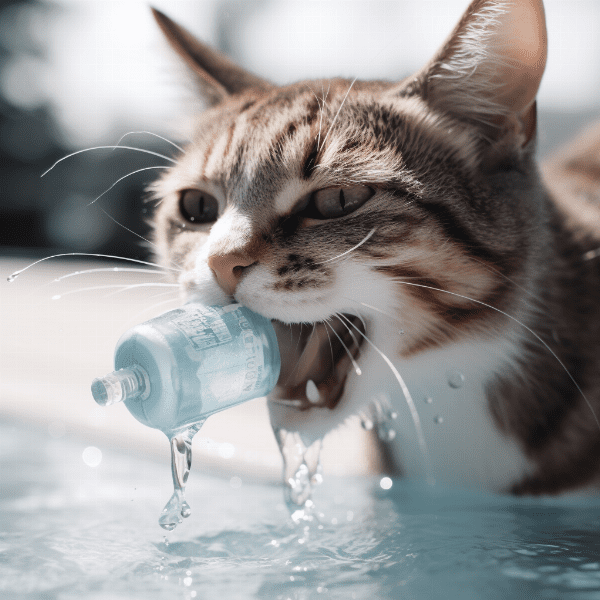
Finger brushes and silicone brushes for sensitive cats
For cats who are sensitive to traditional toothbrushes, finger brushes and silicone brushes can be a gentler alternative. Here’s what you need to know about using these types of brushes for your cat’s dental hygiene.
Benefits of finger brushes and silicone brushes
Finger brushes and silicone brushes are gentle and flexible, making them a good option for cats who may be afraid of traditional toothbrushes or have sensitive gums. They also allow for better control and precision, making it easier to reach all areas of your cat’s mouth.
How to use finger brushes and silicone brushes
To use a finger brush, simply slip the brush over your finger and apply a small amount of toothpaste. Gently massage your cat’s teeth and gums in a circular motion, being careful to avoid their tongue and throat.
Silicone brushes work similarly to traditional toothbrushes, but with a more flexible and gentle design. Apply toothpaste to the bristles and gently brush your cat’s teeth and gums.
Choosing the right brush
When choosing a finger brush or silicone brush for your cat, look for products that are specifically designed for feline dental hygiene. The brush should fit comfortably over your finger or in your hand, and the bristles should be soft and flexible.
You should also consider your cat’s preferences, as some cats may prefer the feel of a finger brush over a silicone brush or vice versa.
Examples of finger brushes and silicone brushes
Here are some examples of finger brushes and silicone brushes that are designed for cats:
- Vetoquinol Enzadent Finger Brush
- H&H Pets Finger Toothbrushes
- Petsmile Professional Pet Toothbrush
- Lobeve Cat/Dog Finger Toothbrush Kit
In conclusion, finger brushes and silicone brushes can be a gentle and effective way to clean your cat’s teeth. By choosing the right brush and following proper techniques, you can help keep your cat’s dental health in check without causing them discomfort.
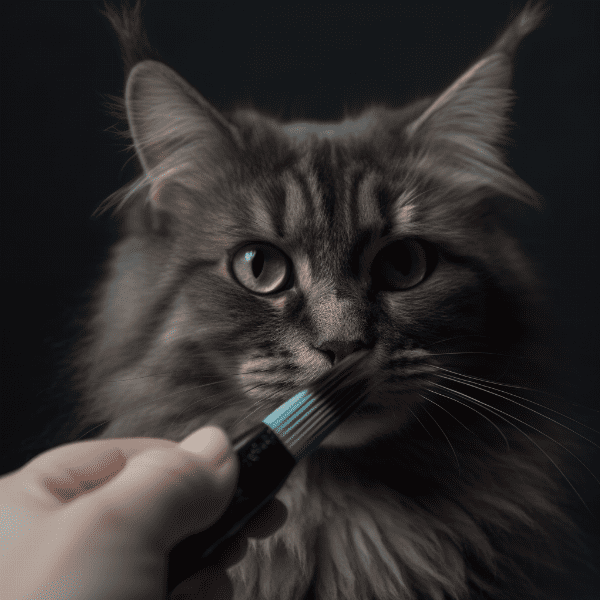
Professional dental cleanings for cats
While regular at-home dental care is important, sometimes professional cleanings are necessary to maintain your cat’s dental health. Here’s what you need to know about professional dental cleanings for cats.
When to consider professional dental cleanings
Professional dental cleanings should be considered if your cat has signs of dental disease, such as bad breath, red or bleeding gums, loose teeth, or difficulty eating. Your veterinarian may also recommend professional cleanings if your cat has a history of dental issues or if they are prone to dental disease.
What to expect during a professional dental cleaning
During a professional dental cleaning, your cat will be under anesthesia to ensure their safety and comfort. The veterinarian will examine their teeth and gums, clean away any plaque and tartar buildup, and may perform extractions or other procedures as needed.
After the cleaning, your cat may need to take antibiotics or pain medication, and you will receive instructions for at-home care to help prevent future dental issues.
Benefits of professional dental cleanings
Professional dental cleanings can help prevent serious dental issues and improve your cat’s overall health and wellbeing. By addressing dental issues early on, you can avoid more expensive and invasive procedures in the future.
Cost considerations
Professional dental cleanings can be costly, and the price can vary depending on your location and the severity of your cat’s dental issues. However, investing in professional cleanings can save you money in the long run by preventing more serious dental issues and the need for more expensive procedures.
In conclusion, professional dental cleanings can be an important part of maintaining your cat’s dental health. By addressing dental issues early on and following proper at-home care, you can help keep your feline friend’s teeth healthy and prevent more serious issues down the line.
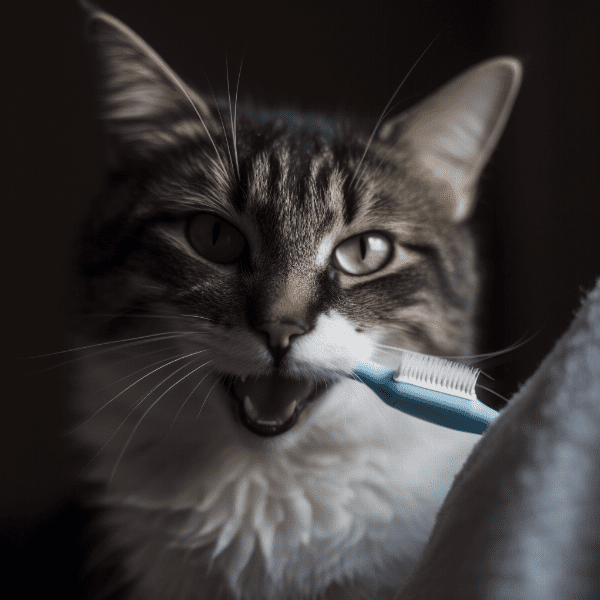
Tips for maintaining your cat’s dental health
Regular dental care is crucial to maintaining your cat’s overall health and wellbeing. Here are some tips for keeping your cat’s teeth clean and healthy.
Start early
It’s important to start your cat’s dental care routine early, ideally when they are still kittens. This can help them get used to having their teeth and gums touched and make dental care less stressful for both you and your cat.
Use proper brushing techniques
Brushing your cat’s teeth is one of the most effective ways to prevent dental disease. Use a soft-bristled toothbrush and toothpaste that is specifically designed for cats. Brush gently in a circular motion, being careful to avoid their tongue and throat.
Incorporate dental chews and treats
Dental chews and treats can be a great supplement to your cat’s dental care routine. Look for products that have earned the Veterinary Oral Health Council (VOHC) seal of approval, and consider your cat’s size and chewing style when choosing the right product.
Use water additives
Water additives can be an easy and convenient way to help keep your cat’s teeth clean and freshen their breath. Look for products that are specifically designed for cats and have been approved by the VOHC.
Schedule regular professional cleanings
Even with regular at-home care, professional cleanings may be necessary to maintain your cat’s dental health. Talk to your veterinarian about scheduling regular cleanings, especially if your cat has a history of dental issues.
Monitor your cat’s diet
A healthy diet can contribute to good dental health. Avoid feeding your cat sugary or sticky foods, which can contribute to plaque buildup. Consider feeding your cat a high-quality, grain-free diet that is designed to promote dental health.
In conclusion, maintaining your cat’s dental health is an important part of their overall wellbeing. By incorporating these tips into your cat’s routine, you can help prevent dental disease and keep your feline friend healthy and happy.
